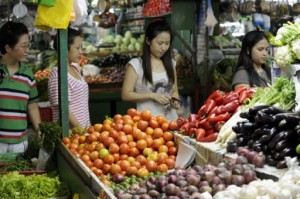
Customers buy vegetables in Farmer’s Market in Quezon City in this 2011 file photo. Philippine inflation in January 2012 registered 3.9 percent, the lowest in 13 months as price increases in food and non-alcoholic beverages slowed, the National Statistics Office said on Tuesday, February 7, 2012. AFP PHOTO/JAY DIRECTO
Inflation further eased to a 13-month low of 3.9 percent in January as price increases in food and non-alcoholic beverages slowed, the National Statistics Office (NSO) reported Tuesday.
Year-on-year inflation rates were 4.2 percent in December and 4.8 percent in November 2011.
In January this year, the slower annual increase in the prices of alcoholic beverages and tobacco; furnishing, household equipment and routine house maintenance items; health, and fuel contributed to the downtrend.
Inflation in Metro Manila picked up to 3.5 percent in January from 3 percent the previous month. Annual gains were higher in clothing and footwear; housing, water, electricity, gas and other fuels; recreation and culture; and restaurants and miscellaneous goods and services indexes.
Areas outside the national capital region followed the national trend with a slower rate of 4 percent in January from 4.5 percent in December 2011. Slowdowns in annual increases were recorded in all the commodity groups, except in the communication and education indexes.
Benjamin E. Diokno, economist at the UP School of Economics, said the further easing in prices was a combination of weak demand and stable supply of food. “It means less margin for all. Consumers are more cautious in spending because of uncertainty and perhaps, for some, because they are paying off their debts,” Diokno said.
Cid L. Terosa, professor at the University of Asia and the Pacific, said the slowdown in inflation could indeed be understood by business as an indication of weak demand and, therefore, weak market prospects.
Yet it was generally welcome news for government and business, Terosa said. He said those in business would be happy to operate in a low inflation environment because such environment meant lower production cost.
“Also, those in business will see an opportunity to profit because a low inflation environment means greater purchasing power,” Terosa said.
Assistant director general Ruperto P. Majuca of the National Economic and Development Authority welcomed the substantial easing of inflation as it “bodes well” for economic growth.
“A lower inflation gives consumers more purchasing power and, in general, stimulates economic activity,” he said.
Originally posted: 1:26 pm | Tuesday, February 7th, 2012